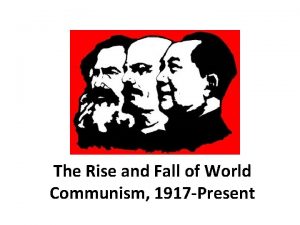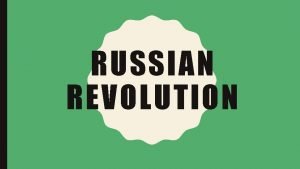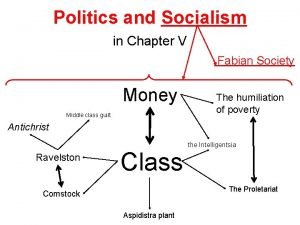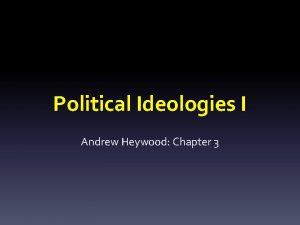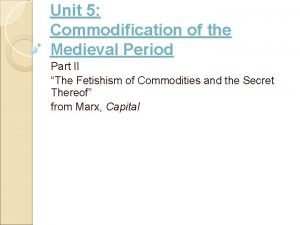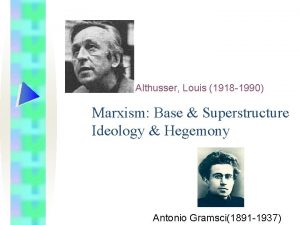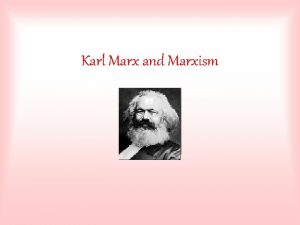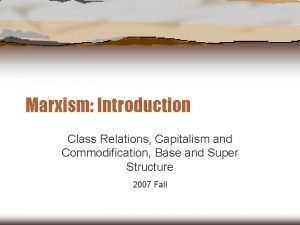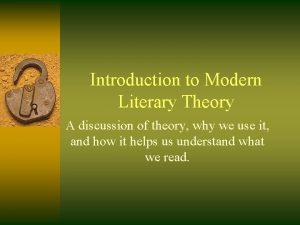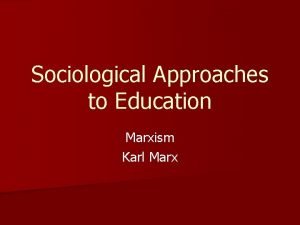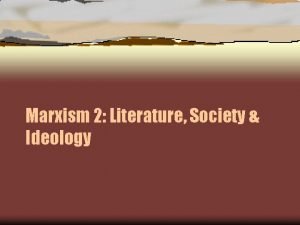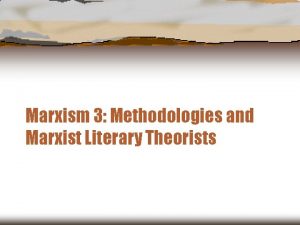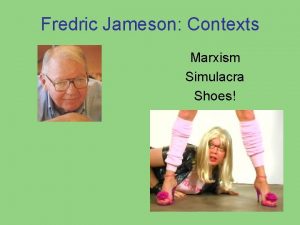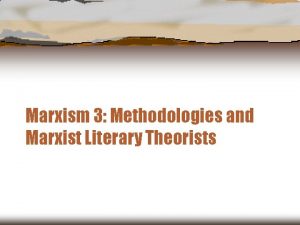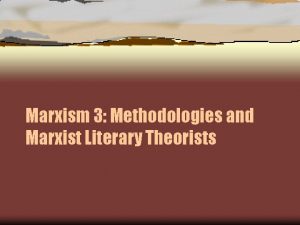th Marxism 18 Century What is Marxism A









- Slides: 9

th Marxism; 18 Century

What is Marxism? “A political-economical theory that presents a materialist conception of history, a non-capitalist vision of capitalism and other types of society, and a non-religious view of human liberation. At its core, Marxism holds a critical analysis of capitalism and a theory of social change. ” Marxism is based on the work of Karl Marx, a nineteenthcentury philosopher. Marxists believe that economic and social conditions determine religious beliefs, legal systems and cultural frameworks. Art and Literature should not only represent these conditions truthfully, but also to improve them.

Marxist Ideologies • Marx believed that capitalist society is divided into two social classes: - The working class, or proletariat, who sell their labour and do not owns the means of production. The bourgeoisie, who own the means of production and employ the proletariat. The bourgeoisie may be further subdivided: 1. Wealthy bourgeoisie who do not also need to work themselves 2. Petty bourgeoisie who employ others, but also work themselves. -

Marxism In Literature Marxist literary criticism is a critical practice in order to understand literature from the perspective of “historical materialism. ” It was developed by Karl Marx was deeply involved in literature, and drew upon his favourite authors who included: Shakespeare, Aeschylus and Goethe, even in his economic writings. The Marxist literary presumption is based on the idea of socialism and capitalism. In the pivotal centre of Marxism is Economics. This is where equality is very important, and nobody has more or less money than anyone else. Marxists tend to believe that the Economic and Social conditions revolve around religious and cultural beliefs. Therefore, Art and Literature are seen to not only represent these conditions but to also improve them.

How did critics recognize Marxist concepts? Literature reflects on class struggle and materialism. Therefore Marxists generally view literature: “Not as works created in accordance with timeless artistic criteria, but as 'products' of the economic and ideological determinants specific to that era" (Abrams 149). Many Marxist's also view Literature as: reflecting an author's own class or analysis of class relations, depending on how sharp or shallow the analysis is. Marxist critics are careful readers/audience who will keep issues related to power, value and money, as well as paying attention to how the characters overcome oppression, the role that class play’s, and if social conflicts are ignored or blamed elsewhere?

Why was Macbeth written? Shakespeare’s purpose for writing Macbeth was to honour the new King from Scotland in Pre 1800. Many of the events that take place in the play are associated with King James. The fact that the play deals with treachery and deceit is because of the constant attempts to murder King James. Macbeth started out as the Thane of Glamis in the play is because King James was once held hostage by this thane. There is a link to the witches in Macbeth with King James. As he was interested in Witchcraft, he wrote a book on it because his wife Anne of Denmark was associated with a storm, and later the witches went to King James and informed him that the devil had made the witches send the storm.

The world and times that Macbeth lived in was where status was gained by murder. Social progress is also a key concept related to Marxism. It includes the progression of the whole community to where everyone is equal. A Marxist’s view of materialism is seen as disgraceful and a step backwards. This is because those who feel that they need to build up wealth tend to not understand their relationships and responsibility to their fellow individuals. Macbeth lacks his self-respect and confidence, because he is conforming to the expectations of those around him, especially his wife; Lady Macbeth. As Lady Macbeth uses her feminist skills to influence her husband to murder Duncan, Macbeth keeps the idea of power in mind, which makes him become materialistic just as his wife. Materialism is one of the concepts that Marxism is against, because Marxist views on equality are very strong, and if one person has control of wealth, then there is no equality within the community.

Macbeth continues going down his social regression line. He becomes heartless, as his mind is set on one thing. Power. Therefore constantly killing people gets easier for him. When Macbeth was loyal to his country as he had killed for his nation, he was fitting in with the Marxist theory. However, Macbeth kills Duncan for his own and selfish good. This is at the start of the anti-Marxist actions Macbeth takes. When Banquo was murdered, the audience clearly understand that Materialism has blinded Macbeth, and that the eagerness for power can go wrong in all kinds of ways. The quote “Blood will have blood” demonstrates to the audience that Macbeth has realized that the murder’s he continues to commit are endless, and he is aware that there is no way he can stop unless he is himself killed. Greediness, blood, wealth, lies and deceit is what Macbeth and Lady Macbeth went through to get nothing in the end. This tragedy displays social regression. There was no fight for equality between the community in Macbeth, but only materialism. Macbeth knew that he had to earn the throne, or it would be given to him, by the will of god. However as Macbeth killed Duncan, he did gain the status he wanted, but had to continue killing others in order to maintain his status. Greed and money from an economic point of view was the thing that could be directly related to Marxism.

Wiatt Ropp supports his theory that Shakespeare legalizes power and supports values with the belief that Macbeth’s goal and brutal behaviour “subverts his world’s natural order, and it results in the ruin of himself and those around him. ” Macbeth’s decay of: Political order (killing the king) Moral order (his lying and deceit) Religious order (witches prediction/advice) Gender Domination order (Lady Macbeth’s influence) The allusion is that Shakespeare and Macbeth both exist in order to support the established authority and social order, and that the authority is fair to all, and that those who threaten it, such as Macbeth deserve to be punished.
